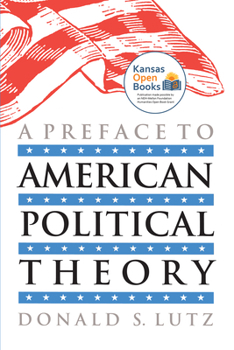A Preface to American Political Theory
(Part of the American Political Thought Series)
Select Format
Select Condition 
Book Overview
Donald Lutz begins A Preface to American Political Theory by explaining what the book doesn't do. It doesn't begin with a panegyric to the American founding. It doesn't answer the following questions: "What are the basic principles in the U.S. Constitution? What were the intentions of the founders with respect to (fill in your own topic)? What is the meaning of pluralism, or separation of powers, or democracy, or (fill in your own concept)?" In short, it doesn't provide an overview of the content, development, or major conclusions of American political theory. What it does do is provide "a pre-theoretical analysis of how to go about studying questions like the ones above-how to conceptualize the project, how to proceed in looking for answers, how to avoid the logical traps peculiar to the study of American political theory." Lutz sets out to emancipate American political theorists from empiricism and inappropriate European theories and methodologies. The end result is to establish the foundation for the systematic study of American behavior, institutions, and ideas; to provide a general introduction to the study of American political theory; and to illustrate how textual analysis, history, empirical research, and analytic philosophy are all part of the enterprise. Designed for students and scholars in all disciplines, including political science, history, and legal studies, A Preface to American Political Theory doesn't provide answers to central continuing issues in American political theory. Rather, it provides an effective, sophisticated entree into the study of American political theory. Readers will be armed with the intellectual tools to engage in systematic study and makes them aware of the pitfalls they will inevitably encounter.
Format:Paperback
Language:English
ISBN:0700605460
ISBN13:9780700605460
Release Date:September 1992
Publisher:University Press of Kansas
Length:200 Pages
Weight:0.69 lbs.
Dimensions:0.5" x 6.1" x 9.0"
Customer Reviews
1 rating
The Lutzian project and methodology
Published by Thriftbooks.com User , 17 years ago
This book is best seen within the context of Donald Lutz's career. His early career was highlighted by a prolonged investigation into the colonial documents and tradition that culminated in the U.S. Constitution. This investigation culminated in the publication of two important books. The first was a collection co-edited by Lutz along w/ Charles Hyneman, American Political Writing During the Founding Era: 1760-1805. This is an essential collection of pamphlets, articles, speeches, essays, sermons, etc. from the period in question. The second book was Lutz' summary of his learning from this period of work, The Origins of American Constitutionalism (I promise a review within a week or two). This latter book is one of the most important books published on its subject matter within the last 30 years or so. The work under discussion is a summation of his methodological reflections from that period of investigation. He is suggesting how someone who is approaching the investigation of the American political theory (which I will call Apt) should conduct their work. He wants to outline what he thinks is distinctive about the field, what are appropriate methodologies, what the source material is and how to avoid certain common fallacies. One of his main goals is to distinguish Apt from the European tradition of political theory. The first difference he notes is that Apt "has always worked implicitly from an operational definition of politics based on constitutionalism" (p.23). Lutz believes that that was the case from the earliest colonial times. From the earliest settlements, colonists wrote compacts based on charters that were the first steps toward our current understanding of a constitution. Those documents came to consistently meet the following requirements: to define a way of life, to create and define a people, define the political institutions that form the government, define the regime, the public and citizenship, establish authority, distribute political power, manage conflict and limit governmental power (24). One of Lutz' later books, The Colonial Origins of the American Constitution (published by Liberty Fund) contains many of the documents that Lutz sees as being part of this development. Apt (in Lutz' view) is thus a discipline that is based on foundational documents that "speak institutionally rather than philosophically" (27). This is another of the differences that distinguishes Apt from the European tradition. This difference implies others. The European tradition is based on the theoretical works of an intellectual elite. They often contain meanings that must be teased out of the work through great effort. Apt is based on the work of what Lutz calls "the political class" (102). This is that 10 to 15% or the population that is politically engaged throughout our history. These were people who wrote in order to be clearly understood so that the institutional ideas they were suggesting would receive the consent of the people. Their work of





